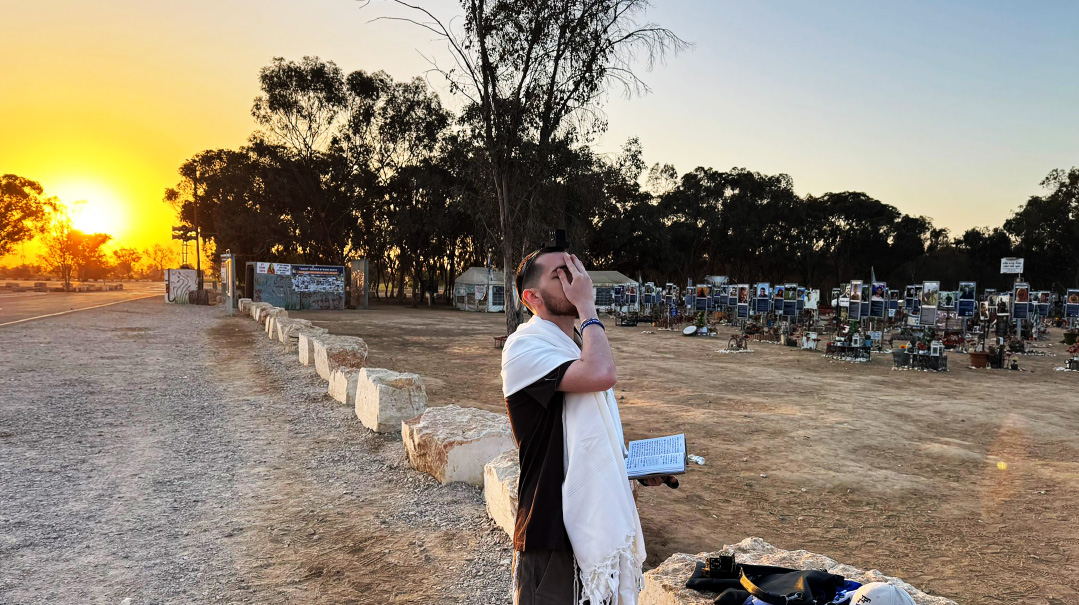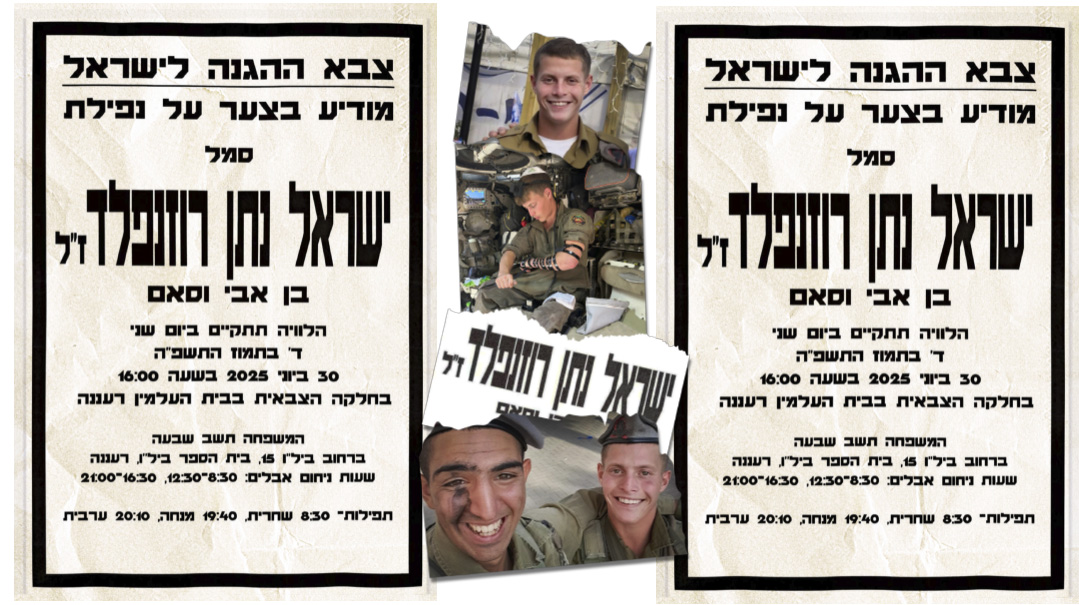(Wo)Manning the Fort Alone
| May 7, 2024I couldn’t stand in the way of him doing what he felt he needed to do

“The day of his homecoming was a fairy-tale day. We made him signs, and the next night, Friday night, we made him a big welcome-home oneg, inviting all his friends. It was so exciting,” remembers Eliana Silverman, an Englewood, New Jersey, expat living in Ramat Beit Shemesh.
But that fairy tale came after four long and lonely months. “In all the years we were married, whenever my husband brought up miluim, reserve duty, I’d be terrified that if he went, he wouldn’t come back alive,” Eliana says.
And then came October 7, when it was clear that her husband would be called up to war.
Eliana had a week’s reprieve before her husband’s unit was called up to be stationed in Chevron, but that didn’t make the goodbye any easier. “Saying goodbye was in a sense anticlimactic, because we’d been talking about it all week and worked through all my fears and stresses. And seeing how difficult it was for him not to be there made me realize how important it was for him to go and how vital my support for him was — that I couldn’t stand in the way of him doing what he felt he needed to do.
“When I actually said goodbye, it was almost like saying goodbye to him for the day. He really didn’t think he’d be gone for four months. We were thinking more like a few weeks. But over the course of the day the reality that he’d left gradually sank in, until by the time the kids came home, I literally couldn’t stop crying.
“For the first three days, I was frozen. I just couldn’t believe this reality was coming true. But then it was Shabbos, and I knew I had four little kids, and they needed their mother.”
On the Home Front
Of paramount importance to Eliana was affording her husband the leeway to do his job without worrying: Is my wife falling apart? Is my home falling apart because I’m here? “We had to be strong for him here so he could do what he had to do there.”
Each of her children coped differently with their father’s absence. “My three-year-old was more affected than I ever could have imagined. She basically tantrumed for the four months he was gone. And I saw how, magically, when he came home for good, everything just switched back. She was herself again, because she was getting what she needed from two parents.
“My husband came home on a short leave for Chanukah and stayed for two nights. When he left that was really hard for him. My oldest was hugging him and crying, saying, ‘We don’t want you to leave anymore, please stay, don’t go back.’ ”
Eliana reflects on the Shabbosos alone, when she had to make plans for her family. “I felt like a seminary girl, figuring out every week anew where I’d be eating. I mean, I got married for a reason,” she jokes. “Wasn’t it so I wouldn’t have to make Shabbos plans every week for the rest of my life?! And here I was back to that.”
Although Eliana’s husband was involved in dangerous missions and on occasion would call her to request extra Tehillim in advance of a particularly risky maneuver, she never actually feared for his life. “I remember thinking at times, ‘Oh, wow, I can’t believe he’s doing that,’ or ‘Oh, wow, that’s really scary,’ but I knew he wasn’t scared. He never presented his situation as fear inducing, even if he was realistic that people do get killed in war. Whenever I addressed that, he’d explain that a person will die whenever Hashem decides their time is up, whether it’s in Sloan-Kettering, or in a car accident, or from a heart attack. But he believed that Hashem’s ratzon is his ratzon, and then what’s there to fear?”
Eliana admits that she didn’t sleep well for four months, but it wasn’t necessarily because she feared for his life. “I was just worried about him in general, that he was cold, or wet, or hungry.”
During that time, Eliana relied on the lifesaving piece of advice a close friend had given her. “She told me to go to a quiet place and simply give over my hardships to Hashem. ‘If He put you in this situation in the first place, He will help you get through it,’ she said. Once I started doing that, I really felt I had Someone bearing my load with me. And that’s carried over. I continue to turn to Hashem, even with mundane things now, like finding a parking spot. Hashem didn’t put me in any situation without a reason, so why not let Him help me through it?
“My tefillah was much deeper and more powerful while he was away,” Eliana shares. “But I don’t want tefillah to be something I only avail myself of when I’m in need and in pain. I remember those incredibly lonely nights when I turned to Hashem. I thought to myself, I never want to forget how I feel now. I want this intense closeness to Him to carry over to the rest of my life.”
An Ezer K’negdo
After four interminable months as the sole adult responsible for her family, Eliana received the unexpected news that her husband was coming home for good. In an astonishingly altruistic gesture, she gave him the option to stay on. “I know that my husband loves being home and loves his family. But I also know that he wouldn’t be able to stomach sleeping in his bed and going to work and living normally while there’s a war going on and people are dying. So I told my husband that if he felt he needed to stay and be assigned to another unit I’d support him.”
She was only able to do this, Eliana says, because she had set herself up technically to succeed, “I had babysitters arranged. My friends helped me with meals — I’d figured out how to make it work. It was going as well as it could have, under the circumstances.”
In the end her husband declined her offer, but for Eliana, her readiness to continue with the status quo confirmed something far more significant. “I realized I had zero resentment over the four months he wasn’t with me. I wasn’t angry or holding a grudge or feeling he had a four-month debt to repay me.
“I truly understand a wife whose husband was away would feel resentful — those four months weren’t easy by any account. But I just tried to stay focused and feel united with him throughout. We weren’t two separate entities, he in Chevron, me at home. We were doing this together, even if we were apart for so long.
“My worst nightmare was always that my husband would leave me to go to war. Now, I don’t just feel I survived my worst nightmare, I feel I surpassed it with flying colors. I grew tremendously, he grew tremendously, we grew together as a couple and as a family. This was one of the hardest things I ever did, but it helped me realize that once you accept something for what it is and accept that this is obviously ratzon Hashem, you can make it through anything.”
Back to Normal
Reentry into normal life as a couple, living under the same roof, was both a magnificent gift and a substantial adjustment — relearning how to lean on someone, how to share responsibilities. “When you learn how to do everything in the way that works for you and have been functioning for four months with a very specific schedule, it’s different to add another set of needs into the picture,” Eliana admits. “It’s a reset. When eight p.m. comes and the kids are all in bed, I can’t just shut myself off and get into bed or focus solely on things I need to get done. I have to take into account that there’s someone else I care about who needs my time and attention now.”
But Eliana qualifies the adjustment as a minor blip eclipsed by the relief and joy in having her husband home again. “The hakaras hatov I have knowing that he’s safe at home is so much greater than anything else. We’re just so grateful that he’s with us, who really cares about x, y, and z?”
Eliana’s gratitude in having her husband home, safe and whole, is augmented by knowing there are scores of women who will never see their spouse again. In the building next door, a young mother, heavily expectant with her second child, lost her husband in the early phase of the war.
“I think about her every single day. Just knowing that this war took the most important person in her world is unfathomable,” says Eliana. “She’s a young mother in the community just like me, whose husband left to war — granted, to Gaza, a much more dangerous area than my husband was in. But to think that her outcome was so different from mine just underscores the incredible hakaras hatov I have for my outcome.
“Yes, my husband was away for four months, but I didn’t have to live the way so many other women whose husbands were in Gaza lived, with no phone communication, always wondering if he’s okay or not. The terrible unknown they lived through is something I’m so grateful I didn’t have to experience.”
Reverberations
A tremendous boost in gratitude isn’t the only takeaway Eliana garnered from her experience. In many ways, it provided a paradigm shift that continues to reverberate. As soon as her husband left to Chevron, she took on a specific kabbalah that she continues to observe even now that he is home.
Her empathy for single parents has also increased exponentially. “After the last four months, thinking about going through anything in life alone, without someone to share it with, is terribly painful. Knowing that not everyone has someone who cares about them, is there for them, and supports them is something I think about all the time.”
Eliana’s appreciation for the mundane, quotidian pleasures in life has also shifted. Appreciating the drop-offs and the pickups. The technical little pieces that merge to create a smoothly functioning family matter more now. And having someone to share that journey, to revel in the indefinable beauty of a monotonous, unexceptional day is tremendous. “I value everything so much more,” she says. “Just the happiness in being home, safe, together.”
(Originally featured in Family First, Issue 892)
Oops! We could not locate your form.







